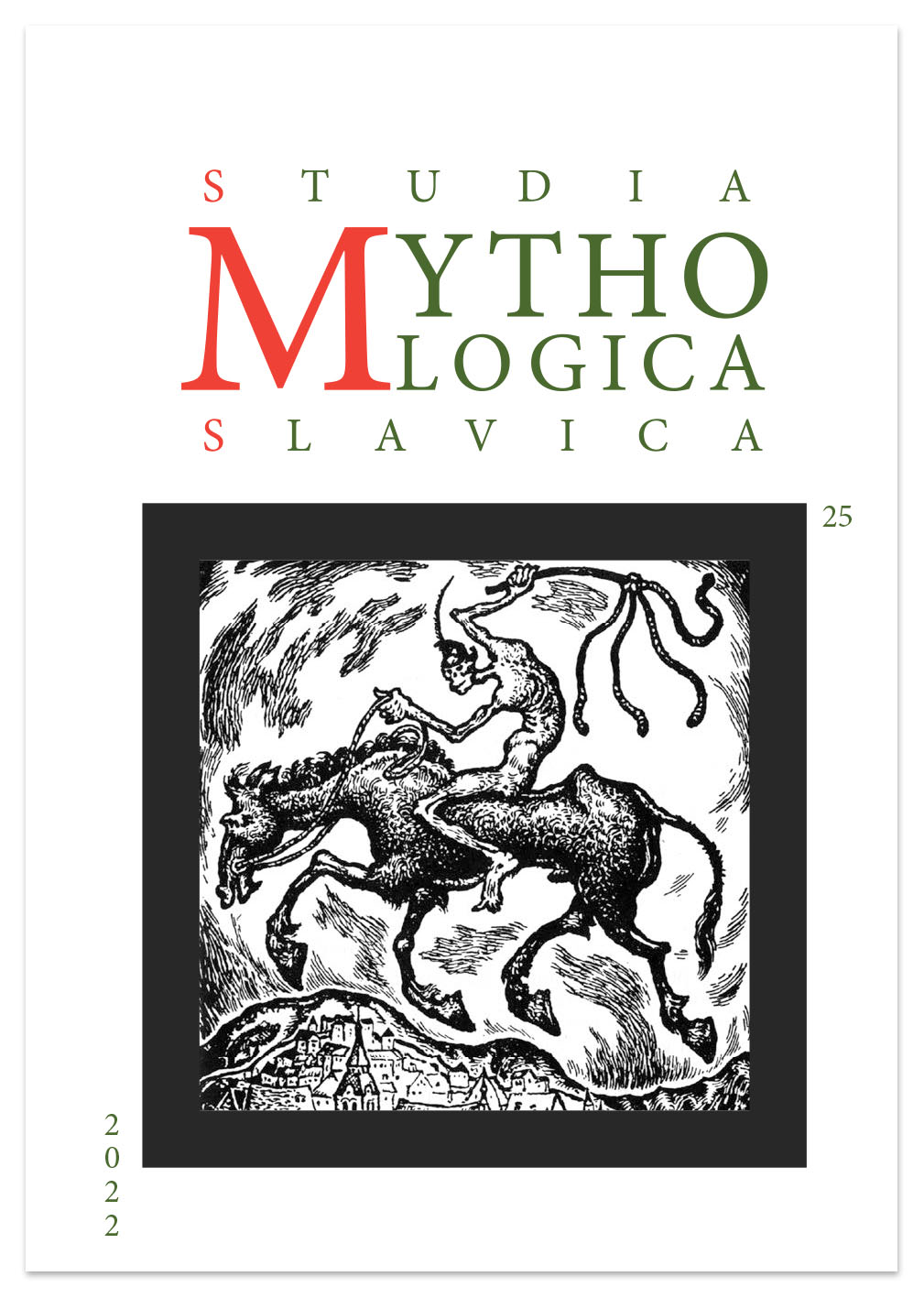Čustva strahu v pripovedih o kugi in sodobni pandemiji Covid-19
DOI:
https://doi.org/10.3986/SMS20222501Ključne besede:
pandemic, plague, COVID-19, folklore, contemporary legendsPovzetek
Pripovedi o kugi in drugih pandemijah povzročajo strah in napovedujejo smrt in lakoto ter povzročajo vrsto čustev med ljudmi, predvsem nelagodje. V tem članku je analizirano, kako pripovedno izročilo o kugi, čeprav staro in preživeto, ponovno prihaja na dan v kolektivnem spominu in podzavesti, ko ljudje ponovno doživljajo podobne izkušnje, kot jih je izkusilo človeštvo pred stoletji. Čeprav pandemija Covid-19 – s katero se soočamo med leti 2019 in 2022 – ni tako smrtonosna kot kuga, jo vendar občutimo, kot stalno grožnjo. V članku je predstavljeno, kako stari tradicionalni družbeni konstrukti ponovno prihajajo na dan v sodobnih povedkah in pripovednih diskurzih o Covidu-19 in kako se občutje strahu odraža v družbenem življenju ljudi, kakor tudi v njihovih pripovedih, vicih, teorijah zarote in lažnih novicah, ki krožijo po spletu.
Prenosi
Literatura
Brodie, Ian, 2020: Precedent: COVID-19 and Vernacular Response. Contemporary Legend. Series 3, Volume 10: Special Issue on COVID-19, 1–16.
Byford, Jovan. 2014: Beyond belief: The social psychology of conspiracy theories and the study of ideology. In: Antakiand, C.; Condor, C., (eds), Rhetoric, Ideology and Social Psychology: Essays in Honour of Michael Billig. Explorations in Social Psychology. London: Routledge, 83–94.
Christiansen, Reidar Th., 1958: The Migratory Legends. A Proposed List of Types with a Systematic Catalogue of the Norwegian Variants. (FF Communications 175). Helsinki: Academia scientiarum Fennica.
Dolenc, Milan; Zupanič Slavec, Zvonka; Makarovič, Marija (ur.), 1999: Zagovori v slovenski ljudski medicini ter zarotitve in apokrifne molitve. Ljubljana: Inštitut za zgodovino medicine Medicinske fakultete Univerze v Ljubljani.
Golec, Boris, 2001: Kužne epidemije na Dolenjskem med izročilom in stvarnostjo. Kronika 49/1-2, str. 23–64.
Grafenauer, Ivan, 1958: Neték in »Ponočna potnica« v ljudski pripovedki. V: Razprave Razreda (II.) za filološke in literarne vede IV. Ljubljana: SAZU, 157–201.
Grimm, Jacob, 1835: Deutsche Mythologie. Göttingen: Dieterich’sche Buchhandlung.
Gunnell, Terry: Mists, Magicians and Murderous Children: International Migratory Legends Concerning the ‘Black Death’ in Iceland. In: Ó Catháin, Séamas (ed.), Northern Lights. Following Folklore in North-Western Europe. Dublin: University College Dublin Press 2001, 47–59.
Hiiemäe, Reet, 1997: Estikatkupärimus [Estonian Plague Tradition]. Tartu: Estonian Literary Museum.
Hiiemäe, Reet, 2016: Narrative Maps of Danger as a Means of Subjective Protection. Etnološka tribina 39, vol. 46, 176–186.
Hiiemäe, Reet, 2021: Introduction into Health-Related Folklore and Its Research: From First-Hand Experience to Second-Hand Narrating Models. Folklore ee. 82, 7–20.
Hiiemäe, Reet; Kalda, Mare; Kõiva, Mare; Voolaid, Piret, 2021: Vernacular reactions to Covid-19 in Estonia: Crisis Folklore and Coping. Folklore ee. 82, 21–52.
Koski, Kaarina 2016: Discussing the Supernatural in Contemporary Finland: Discourses, Genres, and Forums. Folklore ee 65, 11–36.
Krauss, Friedrich S., 1883: Südslavische Pestsagen. (Separatabdruck aus dem XIII. Bande [Neue Folge III. Band] der »Mittheilungender Anthropologischen Geselschaft in Wien«) Wien: Verlagdes Verfassers.
Krauss, Friedrich S., 1890: Volksglaube und religiöser Brauchder Südslaven worwiegend nach eigenen Ermittlungen. Münster.
Kropej Telban, Monika. 2022: Pripovedi o kugi in zdravilne prakse proti tej bolezni v ljudskem izročilu / Folktales about the Plague and Healing Practices against It in Narrative Folklore. Kronika 70, 27–40 in 127–139.
Lee, Jon D., 2014: An Epidemic of Rumors. How Stories Shape Our Perception of Disease. Boulder: University press of Colorado.
Meder, Theo, 2021: Online coping with the first wave: Covid humor and rumor on Dutch social media (March – July 2020). Folklore ee 82, 135–157.
Mencej, Mirjam, 2022: Življenje s koronavirusom v spletni folklori. Studia mythologica Slavica 25, 49–75.
Möderndorfer, Vinko, 1964: Ljudska medicina pri Slovencih. (Classis II, Gradivo za narodopisje Slovencev) Ljubljana: Slovenska akademija znanosti in umetnosti.
Möderndorfer, Vinko; Šašel, Josip, 1972: Koroške pripovedke. Ljubljana: Mladinska knjiga.
Podjed, Dan 2020: Antropologija med štirimi stenami: Spoznavanje družbe in sebe med pandemijo. Ljubljana: Založba ZRC, ZRC SAZU.
Radomirović Maček, Kristina; Babič, Saša: COVID-19 Conspiracy Theories in Slovenia. Studia mythological Slavica 25, 27–48.
Röhrich, Lutz, 2018: Predaja – bajka – narodno vjerovanje: kolektivni strah i njegovo svladanje. V: Marks, Ljiljana i Evelina Rudan (ur.), Predaja: temelji žanra. Zagreb: Institut za etnologiju i folkloristiku, 351–370. [Original: Röhrich, Lutz, 1984: Sage – Märchen – Volksglauben. Kollektive Angstundihre Bewältigung. In: Eifler, Günter, Otto Saame, Peter Schneider (eds.), Angst und Hoffnung. Grundperspektivender Weltauslagung. Mainz: Studium Generale der Johannes Gutenberg-Universität, 173–202].
Selim, Monique, 2021: The pandemic: catalyst, analyzer. In: Selim, Monique (ed.), Anthropology of Pandemic. Paris: Association Française des Anthropologues, 11–18.
Softić, Aiša, 2020: Zapisi usmenih predaja o kugi u Bosni i Hercegovini s kraja 19. stoljeća. Godišnjak. Centar za balkanološka ispitivanaja / Jahrbuch. Zentrum für Balkanforschungen 49 (Govedarica, Blagoje, ur.). Sarajevo: Akademija nauka i umjetnosti Bosne i Hercegovine, 155–169.
Šešo, Luka 2020: The Supernatural Beings of Belief Legends – Old Fears in a New Context. Studia mithologica Slavica 23, 183–202.
Tangherlini, Timothy R. 1988: Ships, Fogs and Travelling Pairs. Plague Legend Migration in Scandinavia. The Journal of American Folklore 101/400, 176–206.
Travner, Vlad, 1934: Kuga na Slovenskem. Ljubljana.
Valjavec, Matija, 1858: Narodne pripovjedke skupio u i oko Varaždina Matija Kračmanov Valjavec. U Varaždinu: Josip pl. Platzer.
Prenosi
Objavljeno
Verzije
- 2022-10-28 (2)
- 2022-10-12 (1)
Kako citirati
Številka
Rubrike
Licenca

To delo je licencirano pod Creative Commons Priznanje avtorstva-Nekomercialno-Brez predelav 4.0 mednarodno licenco.
Avtorji jamčijo, da je delo njihova avtorska stvaritev, da v njem niso kršene avtorske pravice tretjih oseb ali kake druge pravice. V primeru zahtevkov tretjih oseb se avtorji zavezujejo, da bodo varovali interese založnika ter da bodo povrnili morebitno škodo.
Podrobneje v rubriki: Prispevki





